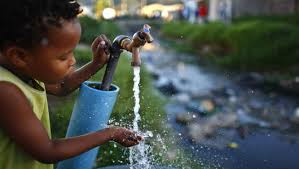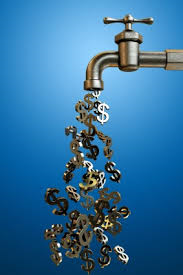Water Availability:
By no means is South Africa struggling to survive due to water. The majority of South Africa’s population is located in urban areas and only about 40% live in rural areas (MIT edu). After visiting most of the urban areas, these areas tend to have a better grasp on water than the rural areas. This is expected due the infrastructure that most urban areas have compared to rural areas. The concern with water in South Africa revolves mostly around the rural areas. Just like most developed countries, South Africa has access to surface water, ground water, and recycled water. Most of South African water comes from their large rivers. These large rivers account fro about 77 percent of South African water use (MIT edu). The biggest stress on South Africa’s water supply consists of the growing population and the main contributor to the population being immigration (MIT edu). Another major problem with South African water is caused by bad piping. These pipes result in about 1.5 million cubic meters of water loss a year (MIT edu). These problems tend to only affect the urban areas since most pipes tend to exist in the major cities. The rural areas on the other hand mostly rely on groundwater, which is about 74 percent of their total water use (MIT edu). A big part of that water goes to agriculture. Most rural areas rely on water to help grow their crops. Another large contributing factor to the South African water supply is stolen water. About 35 percent of Durban’s total water supply is stolen or given out by illegal connections (Water In Crisis).
Economic Factors:
Water in South Africa is controlled by private companies which are regulated by laws and acts that have been passed to help control water (Water Affairs). These laws were passed to reduce the risk of water being taken advantage of by corrupt companies. The South African Bill of Rights ensues that all people have access to water and a healthy environment (Water Affairs). Water in South Africa is not distributed very evenly based on its natural environment. South Africa’s annual rainfall is about 492 millimeters, which is about half of the world average (Water Wise). Therefore South Africa is considered a water depleted country. With this in mind, most of the precipitation falls in the eastern part of the country (Water Wise). This is due to the landscape that South Africa has. This map of South Africa shows the average annual rainfall.
Water access in South Africa is pretty un-even. The reason for this is because of the difference in infrastructure from urban to rural areas. Urban areas in South Africa tend to be more like cities in the United States. These areas have pretty easy access to water. The difference from the United States and South Africa with regards to water comes from rural areas. In the US, these areas have good access to water and the difference from urban areas is not that noticeable. In South Africa, rural areas struggle with a consistent water supply. Although water seems to be more of a demanding resource in South Africa compared to the United States, South African water actually costs less than water in the US. This table is a good example of the cost of living in South Africa compared to the United States.
| United States | South Africa | Difference | |
|---|---|---|---|
| Restaurants | [Edit] | [Edit] | |
| Meal, Inexpensive Restaurant | 12.00 $ (157.93 R) |
7.60 $ (100.00 R) |
-36.68 % |
| Meal for 2 People, Mid-range Restaurant, Three-course | 50.00 $ (658.03 R) |
28.87 $ (380.00 R) |
-42.25 % |
| McMeal at McDonalds (or Equivalent Combo Meal) | 6.87 $ (90.41 R) |
3.80 $ (50.00 R) |
-44.70 % |
| Domestic Beer (0.5 liter draught) | 3.50 $ (46.06 R) |
1.52 $ (20.00 R) |
-56.58 % |
| Imported Beer (0.33 liter bottle) | 5.00 $ (65.80 R) |
1.90 $ (25.00 R) |
-62.01 % |
| Cappuccino (regular) | 3.75 $ (49.29 R) |
1.44 $ (18.95 R) |
-61.54 % |
| Coke/Pepsi (0.33 liter bottle) | 1.66 $ (21.82 R) |
0.78 $ (10.21 R) |
-53.20 % |
| Water (0.33 liter bottle) | 1.34 $ (17.61 R) |
0.63 $ (8.29 R) |
-52.95 % |
The cost of water in South Africa is clearly less than that of the United States. It is actually almost 53 percent less. This is odd to me because the amount of water in South Africa is less than the US so the price of water should be more because it is harder to get. My only explanation is that South Africans must not be as wealthy as Americans.
Hygiene and Sanitation:
South Africa has one of the cleanest water supplies in the world. This is slowing dwindling down due to the lack of sanitation in the rural areas of South Africa. The biggest concern with these areas is a lack of sewage treatments. The threat to water borne disease is becoming more and more likely (Water In Crisis). This problem is getting so out of control that local water agencies are saying any contact with the water can cause an infection (Water In Crisis). The largest river in South Africa, the Vaal River, is the one that has the biggest problem with this sanitation crisis (Water In Crisis). Again, this concern with water has little or nothing to do with urban communities. These problems are consistent for rural areas in all provinces of South Africa. The sanitation issues in rural communities needs to be fixed. As I stated earlier, the South African Bill of Rights demands to give all people water and a healthy environment. With regards to sanitation and water for the rural communities both of these are being violated.




I am surprised that in an area such as South Africa, which most of us see/hear about on Tele as being relatively modernized that there are still such issues. I believe that what we see in the media is only the city areas and they never really discuss the urban areas. In all the blog posts I have read, including my own, failing infrastructure such as leaking pipes appears to be one of the largest water loss components. I know this is even an issue here in the States. Very surprised that as important as water is to all life on Earth, that even in more advanced countries, that the water infrastructure is not one of the top concerns on the list of our governing bodies to fix. It is good that water in South Africa has been protected/made private from corruption–this is a huge problem all over the continent of Africa. My husband works in Takoradi, Ghana every other month and has also had to travel to Equatorial Guinea and Nigeria, and in those areas(Guinea and Nigeria–not Ghana) the level of corruption fro the governments against their own people is sickening. These areas seem to like to keep their people poor and ever in need of help from government for everything, but they rarely receive it. My husbands company is working with the local government in Ghana to install wells and make clean water more accessible to the locals as well as hiring them for certain jobs, but many of these more volatile areas of Africa will not allow them to do so. It is a shame when people from around the world want to help but the governments of these countries will not allow us to help.
LikeLike